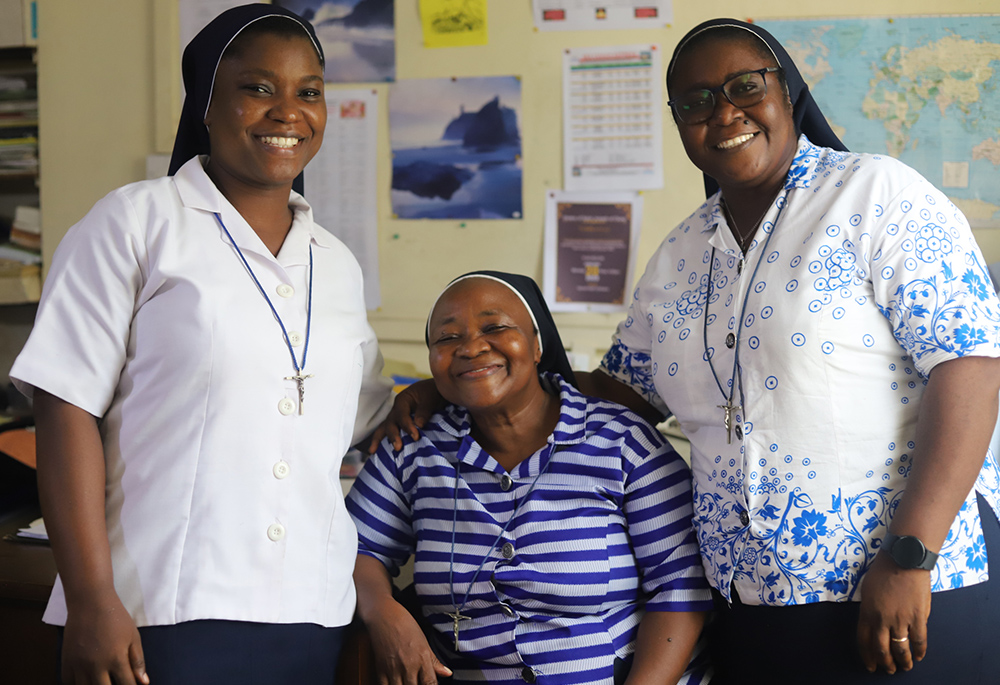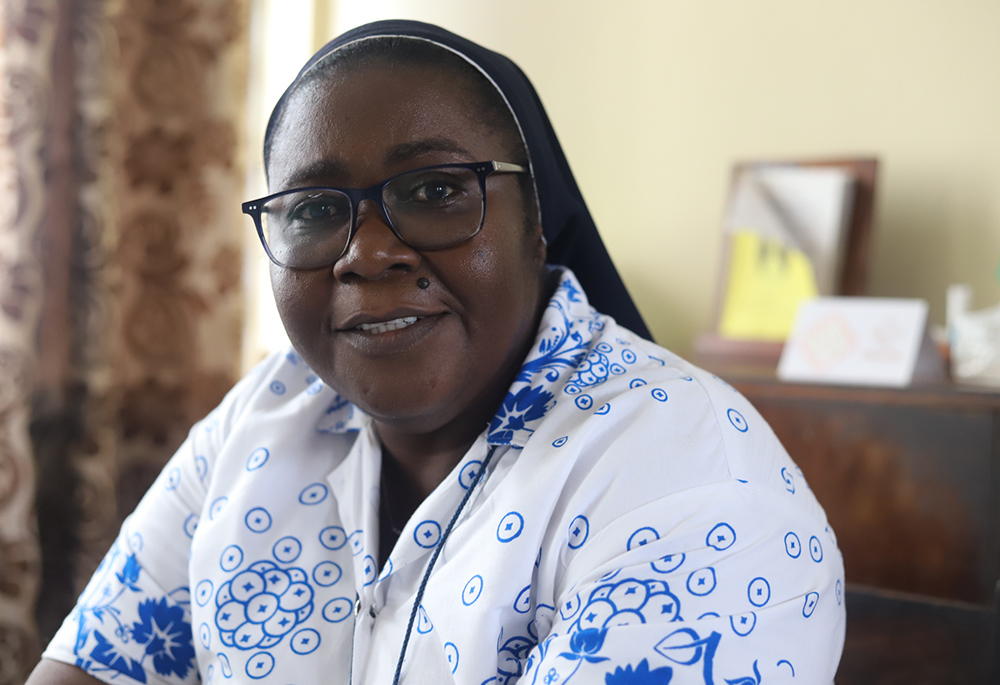
Srs. Angela Mbalu Bangura (right), Elisabeth Asare Buobi (center) and Christiana Fefegula pose for a photo at St. Joseph Primary School in Freetown, the capital of Sierra Leone. Bangura says that as a leader, she delegates duties to other sisters to help her if she cannot reach everybody. (GSR photo/Doreen Ajiambo)
In 2021, after Sr. Angela Mbalu Bangura, a member of the Sisters of St. Joseph of Cluny, was elected as the provincial superior of her congregation, her main objective as a leader was to unify all three West African provinces in three countries — Sierra Leone, Ghana and Gambia — which are under her authority. She referred to this move as "living the synodality," meaning "journeying together as the people of God."
The 51-year-old Sierra Leonean nun said synodality "is a way of listening to each person as a church, understanding how God might be speaking to everyone and learning how we can serve others better together." As a religious, she had been advocating for mutual sharing, empowerment of religious women and inclusivity. Therefore, the official launch of the synod on synodality in October 2021 provided her with the reassurance she needed to lead.
"Synodality reminds us of the work of God in each of us and through all of us working together for our common mission, which is serving the poor," she said.
Bangura noted that as religious women, they have always lived the synodality by doing things together and building each other. Therefore, the actualization of synodality didn't come as something new but rather like what they had practiced throughout.
"Synodality for us as religious is not new. It is our daily life thing because we are always together and do things together," she said. "We live in a community, work as a community and are all informed about everything happening in each community. Every year, we have an annual general meeting, and every six years, we have our chapters to plan for the next six years."
She added: "As religious women, we believe things work better when we work and move together. We cannot move in isolation and achieve something. If we want to do things, then let's go together. Synodality has always been the way religion functions."

Sr. Angela Mbalu Bangura is the provincial superior of Sisters of St. Joseph of Cluny. The congregation is in three countries in West Africa — Sierra Leone, Ghana, and the Gambia. She is also the school administrator of St. Joseph Primary School in Freetown, Sierra Leone. (GSR photo/Doreen Ajiambo)
GSR: Please tell us about your personal life.
Bangura: I made my first vows as a religious in 1995 when I was 21 years old, and my final vows in 2004. I had my first encounter with sisters when I started school. One of the sisters, the head teacher, used to have me sit with her in her office. She would also take me to the convent and give me tea. I saw a lot of work the sisters did throughout my school and was amazed. My younger years were associated with the sisters, shaping my religious call.
I am a trained teacher. In 1996, I left the country because of the civil war and went to India, where I studied, then returned in 2003. I went for further studies in the U.K. and Ireland and did training in formation, and for eight years, I have been a formator for girls who want to be religious sisters. After being a formator for a while, I was made a provincial superior for the three countries, and that is where I have worked up to now.
What does it mean to be a provincial?
In simple language, it can mean being the boss and having all the authority; you are in charge of top decision-making and moving from here to there. So, being a provincial comes with authority, and people see you as a big person, and sometimes people fear you, but it all depends on how you approach people. How you treat people also matters in this position; otherwise, the people you lead might move away from you. I live in a very simple way where I work with my sisters. Sometimes, you will find me working and cleaning and may not even realize I am their leader.
How has it been as a provincial superior for three countries?
It's heavy work because you must deal with different countries with different cultures, and every place has to become your own. Being a Sierra Leonean, I cannot concentrate more here because others will think I am neglecting them. So, balancing what people expect and what I must do as a provincial superior is a task. Expectations can sometimes be very high. Traveling is also part of your life as a provincial superior for three countries. You have to be in all places throughout the year. For example, since I became the superior, I have not stayed in my house in Sierra Leone for more than two weeks.

Sr. Angela Mbalu Bangura, a member of Sisters of St. Joseph of Cluny, interacts with one of her staff members at St. Joseph Primary School in Freetown, the capital of Sierra Leone, where she works as the administrator. (GSR photo/Doreen Ajiambo)
How do you bring unity between these three countries?
Every country is unique. There are some whose character may be violent, some are forceful in how they do things and some are calm and mild. The challenge as a provincial superior is to bring people together and not allow division. As an international congregation, Sisters of St. Joseph of Cluny must walk together with everyone and not leave anyone behind. In my working team, I have sisters from different countries together so that we learn to relate with each other. This is a strategy to bring unity.
The leadership team is also mixed. I have a council that includes leaders from all the countries. In each country, I also have representatives there who help me manage other duties and report to me, and in case I am away, they give me updates on whatever is happening in their different countries.
How successful have you been?
My strategies have been working well for the past two years. Sometimes, a sister will tell you they are uncomfortable serving in one place and request you to move them to another place, even back to their country. These situations are solved by talking to the sisters, realizing the problem and solving it amicably. If the issue is not resolved, then we move the sisters to another place where they can function better. That's why moving around allows me to interact with all the sisters. Once in one of the three countries, I visit each community to talk to the sisters at individual levels. I interact with all of them to get to know them better and know if they have any issues that may require my attention. I do this twice every year.
The target is not to have sisters fill in gaps but to have them in places where they can function better.
How does the Holy Spirit work in your ministry?
None of us can function without the help of the Holy Spirit because certain things are not based on human intelligence. Many things have happened in my life that are not because of my ability but are the works of the Holy Spirit. And if the spirit hadn't intervened, I would not have been able to move from one point to another. Being in leadership, I depend more on the guidance of the Holy Spirit to do certain things. When things are tough, I leave it, go in for prayers and come back later with clarity of mind. That clarity comes when I pray and talk to God about whatever is happening. The Holy Spirit has enabled me to tackle complex tasks that need my attention.
What are your leadership goals?
As a leader, I see Cluny expanding. I want to see a powerful African Cluny women religious who are ready to serve. I want to bring Cluny to a level that everybody will admire. I want to see us as religious women in Africa, proving that we can work to make everyone proud because we are powerful people. We are already working on it because we are in three countries under one umbrella, with one goal, working with the same interests and targets. We want an enjoyable African Cluny that can be known for the right things.
We are in East Africa and Central Africa, which have their leadership, and I would like all of us to be united. And we are already working on it. We have had a meeting to work together. Language is a barrier, so we are trying to tackle the problem by having our sisters interchange. For example, for those in English-speaking nations, we send them to French-speaking [countries] and vice versa, so that they get the chance to learn each other's language. This will help us move together, which is synodality.





